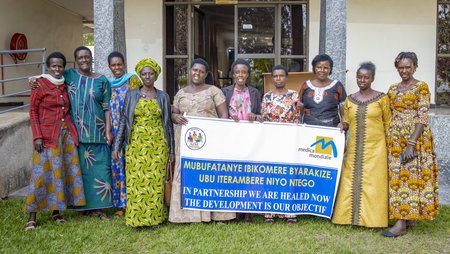Rwanda: Solidarity overcomes social exclusion

“In partnership we are healed, now development is our objective” is the message printed on the large banner displayed by the members of a solidarity group from SEVOTA. Together the women grow vegetables, breed chickens and tailor clothes. They talk about their problems and celebrate successes. And they are there for each other when memories become too painful: most of the women were subjected to sexualised violence during the genocide in 1994. Many of them became pregnant as a result and countless women were excluded from their families and communities. But at SEVOTA they found a new community.
They printed their banner to act as both motivation and message. The motivation is for themselves during their daily work on the fields or behind their sewing machines, and the message is for everyone, declaring their intention to develop a peaceful society.
30 years after the genocide: Peace for a traumatised society
Almost 30 years ago, radical Hutu in Rwanda murdered more than 800,000 Tutsi, moderate Hutu and other opposition members. Hundreds of thousands of women and girls were raped. In the wake of the perpetrators’ brutality, Rwandan society was left deeply fragmented and traumatised.
Around the world, rape is deliberately used to destroy communities. If it is left unprocessed, this violence lives on into times of peace. Not only in the nightmares of the survivors and in their mental and physical scars, but also in the lives of the “children of war” conceived in rape. They often face discrimination and ostracism. In addition, these experiences and their impacts are passed on to children and grandchildren – an effect known as transgenerational trauma.
Integrated empowerment for survivors of sexualised violence
The SEVOTA team wants to break this cycle of violence. There is no other crime where the disgrace associated with the act is transferred from the perpetrator to the victim as it is with rape or other forms of sexualised violence. Stigmas and taboos make it difficult for many women to process their experiences. For these reasons, the staff at SEVOTA apply an integrated approach to empowerment:
- Women’s forums, led by psychosocial specialist staff, offer a safe space for survivors to experience solidarity and regain strength.
- Psychosocial one-to-one and group therapy sessions help mothers and their children learn to process the deep psychological wounds in their lives.
- Credit and know-how are offered by SEVOTA to the women to support them as they establish small businesses.
- Regular “Empowerment Weekends” offer psychosocial strengthening for children and young people around the issues of love and relationships, sexuality, and positive parenting.
- SEVOTA helps “children of war” establish self-help groups.
Breaking through stigma and questioning gender roles
Currently, the participants in their project activities number more than 400 women and 200 of their children born out of violence, who are now adults. Their husbands are also involved. SEVOTA offers workshops where – sometimes by themselves, sometimes together with their wives – they learn conflict-resolution strategies and are offered a space to discuss gender roles. The team is also planning a campaign on the issue of positive masculinity to reach out to more men.
Furthermore, SEVOTA is also working with other organisations to campaign for financial compensation from the government for all survivors of sexualised violence committed during the genocide. This would also ensure official acknowledgement of the women’s suffering and help to break down the taboo a little more.
Appeared in memo 2023/1 (german)



